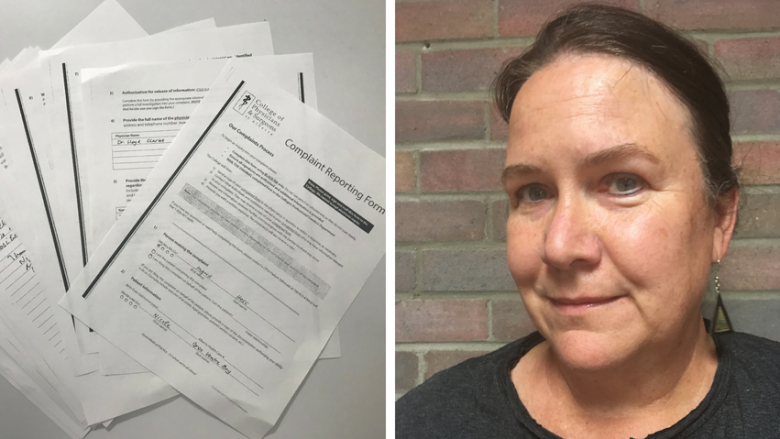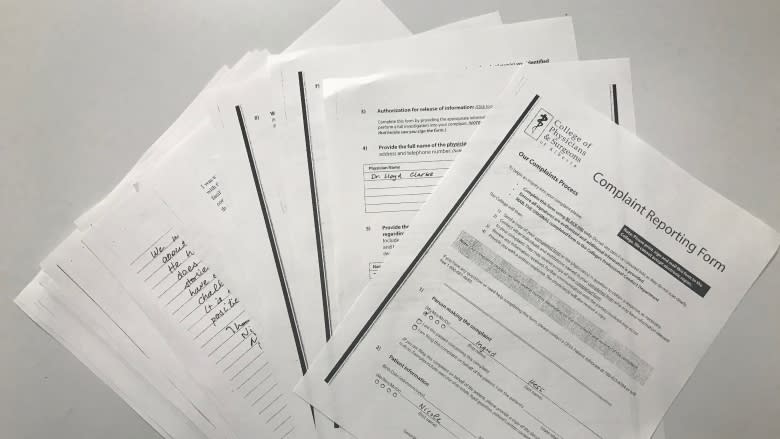Cardston doctor under fire for alleged racist confrontation with Indigenous people
A southern Alberta doctor is engulfed in controversy after he allegedly told a group of Indigenous people who are homeless to "get a job" and sarcastically asked them if they wanted prescriptions for the addictive painkiller Tylenol 3.
Alberta Health Services has placed Dr. Lloyd Clarke on administrative leave from his position as the associate medical director for the southern region of the province, while the health authority investigates the incident.
A lawyer representing two of the Indigenous people involved filed a complaint with the regulator and watchdog for physicians, alleging Clarke's "racism against my community members impairs his ability to treat us as patients in a proper way."
After reviewing the case, the College of Physicians and Surgeons of Alberta rejected the complaint. But Ingrid Hess, the lawyer and a First Nations advocate, is appealing.
Hess says the alleged incident, which witnesses say took place outside a Cardston convenience store in May, has triggered outrage among members of the neighbouring Blood Tribe and inspired efforts to document other claims of racism in the region.
Clarke doesn't confirm or deny
The lawyer says she didn't witness it, but took a statement from some of the people involved, and filed the complaint on their behalf. She also notified Alberta Health Services.
Clarke, who practises at the Cardston Health Centre's emergency department and at a separate clinic in the town, didn't confirm or deny the incident occurred when reached by a reporter.
"I'm aware that the appropriate bodies are investigating this and I'm co-operating with that," he said.
When asked in a follow-up interview to comment on allegations he has racist views toward Indigenous people, Clarke said, "It's not appropriate for me to comment. I'm working with the investigation to go through this in the proper channels. I am co-operating completely with them."
According to AHS, if any of the First Nations people involved in the alleged incident seek care at Cardston's emergency room, they don't have to receive care from Clarke, unless they have life-threatening problems that require immediate attention.
"There is no excuse for the comments that were allegedly made in this instance, and we want to assure those involved in this incident that this sort of alleged language in no way reflects the beliefs or values of AHS," the health authority said in a statement.
The College of Physicians and Surgeons, which regulates the medical profession and investigates complaints against doctors, told CBC News Clarke's alleged behaviour is "damaging" and "appears to show poor judgment."
But the college said it doesn't believe Clarke is prejudiced toward Indigenous people, concluding the incident didn't amount to professional misconduct.
In a letter responding to Hess's complaint, the college said it "cannot dictate the behaviour of what a physician does outside a clinical setting, excluding extreme circumstances."
'Blatant biases and negative views'
Hess has appealed the decision, calling for an investigation into whether "Dr. Clarke's blatant biases and negative views of Indigenous people might influence his care of the Indigenous patients he treats, especially if they are drug-addicted, alcoholic or homeless."
Clarke works in Cardston, where an estimated one in seven residents is Indigenous.
Nicole Gros Ventre Boy, one of two people Hess is helping with the complaint, told CBC News she was sitting outside a Cardston convenience store in May when she claims Clarke emerged from the exit.
"He stood there and he told us, 'You guys should get a job' … then he's like, 'My family are scared to come and shop here. You guys just bother people for money,'" she recalled.
'I just felt like he was racist'
"Afterwards, he said, 'Should I write you a prescription of Tylenol 3s?' and he put his hand out and acted like he was writing."
Gros Ventre Boy, who received health care from Clarke in the past, said the comments hurt her.
"I just felt like he was racist, like he didn't like natives," she said. "There was no reason for him to come up to us and talk. We were not doing anything."
Gros Ventre Boy's account lines up with the description of events outlined in Hess's complaint. It's also consistent with how Scott Many Grey Horses remembers the confrontation.
Many Grey Horses said he was not involved with the group, but was walking by when he heard Clarke say, "All you people need to get jobs." In an interview with CBC News, Many Grey Horses said he didn't hear the comment about Tylenol 3, but he intervened in defence of the group.
Clarke called police
He said he was worried at the time the confrontation could come to blows, though Gros Ventre Boy said she didn't believe there was any risk of violence.
"I said, 'You need to get out of here; you're just here to cause trouble,'" Many Grey Horses recalled.
The college said in its letter to Hess that Clarke had called police.
Hess said she has known most of the Indigenous people involved for most of her career and described them as having "overlapping social disadvantages," including homelessness, poverty and chronic health conditions.
She said the allegations concerned her, especially because of the social and power imbalance between a doctor and people who are homeless.
"The people that we're talking about were living in tents on the edge of town," she said. "Those aren't the kind of people who can just go out and get a job at the Reddi Mart in downtown Cardston."
'Concerns like this are damaging'
Steve Buick, spokesman for the college, said the regulator didn't investigate whether the alleged incident actually happened. He said it reviewed the incident to determine whether the claims, if true, violated the college's code of conduct and standards of practice.
"We have no doubt that there is an issue here of behaviour, and we will be telling the doctor that concerns like this are damaging and that he needs to avoid them in the future," Buick said.
"We cannot have a physician practising in a community where the community has good reason to believe that he or she is racist or has other discriminatory views," he said. "But let's be clear: on the basis of this complaint alone, our judgment in the first phase of review is we don't think it necessarily comes up to that standard.
"We don't think that this complaint, on its face, would justify sanctioning a physician or removing him from practice."
Buick said Hess can escalate her complaint to a second stage in the college's process — an appeal to its complaint review committee — if she feels the first decision was unreasonable. She has done that.
"It will be up to the physician in this case to assure patients when he sees them face-to-face, if they're concerned about it at all, that he does not have views that should disqualify him from treating them," he said.
Hess calls case 'extreme'
Buick said the college's priority when assessing complaints is the behaviour of physicians when they are treating patients. Still, he said there have been "extreme" cases in which the college took action against doctors for their behaviour outside the clinical setting.
He cited the case of Dr. Fred Janke, whom the college said would not be allowed to continue practising while he faces child exploitation charges.
Hess said she believes a doctor "exhibiting biased and discriminatory conduct toward a vulnerable and identifiable group of people is pretty extreme."
Clarke's alleged comments were the catalyst that inspired several members of the Blood Tribe to set up camp near the Cardston border in June to document claims of racism. The group said its goal is to raise awareness about prejudice against First Nations people, and to build healthier relationships between the two communities.
Last week, the group dismantled its camp along Highway 5, the dividing line between the town and reserve, after documenting a number of other alleged cases, which members plan to pass along to authorities, including the Alberta Human Rights Commission.
'No excuse' for alleged comments, AHS says
AHS said it's also continuing to investigate the alleged incident involving Clarke, "and will take any necessary action once that investigation is complete."
"We know that trust is a significant barrier to First Nations people accessing the health-care system, and acknowledge that institutional racism and stereotyping have kept people from getting the care they need," AHS said in its statement.
"We also know that the relationship between AHS and First Nations people must continue to improve, and we are committed to building, nurturing and growing those relationships."
- Read more articles by CBC Calgary, like us on Facebook for updates and subscribe to our CBC Calgary newsletter for the day's news at a glance .





